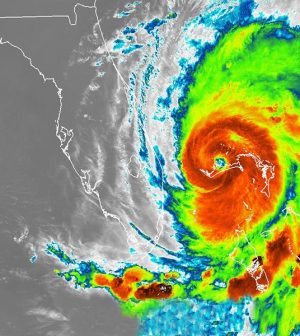- Could Your Grocery Store Meat Be Causing Recurring UTIs?
- Are You Making This Expensive Thermostat Error This Winter?
- Recognizing the Signs of Hypothyroidism
- 10 Strategies to Overcome Insomnia
- Could Artificial Sweeteners Be Aging the Brain Faster?
- Techniques for Soothing Your Nervous System
- Does the Water in Your House Smell Funny? Here’s Why
- Can a Daily Dose of Apple Cider Vinegar Actually Aid Weight Loss?
- 6 Health Beverages That Can Actually Spike Your Blood Sugar
- Treatment Options for Social Anxiety Disorder
Hurricane Dorian Can Wreak Havoc on Heart Health

As Hurricane Dorian rolls up the southeastern coast of the United States, most in its path worry about having enough water, food and batteries to ride the storm out.
But the American Heart Association (AHA) warns that the high stress and trauma of such an event can also trigger heart trouble, especially among heart disease and stroke patients.
The hurricane is forecast to hit Florida, Georgia and North and South Carolina this week.
The AHA also noted that after a major storm, it may be more difficult for people to see a health care provider for a checkup or to get medications, especially for more vulnerable patients.
If you’re in the hurricane’s path, you should write down any medical conditions, allergies, medications, doses and time you take medications, and your pharmacy name, address and phone number, the AHA advised in a news release.
Place your medications and your health information in a resealable plastic bag to help keep it dry.
If your medication is lost, damaged by water or left behind when you evacuate, research open pharmacies and get a refill as soon as possible.
Under Florida law, you can get a 30-day refill of your prescription medication if you live in a county under a National Weather Service hurricane warning or under a Governor-declared state of emergency, or a county that’s activated its emergency operations center/emergency management plan.
In Georgia, South Carolina and North Carolina, you may be able to get a refill of certain medications. Ask your pharmacist to request an out-of-schedule emergency refill to make sure you have enough medicine during the declared state of emergency, the AHA recommended.
If you have diabetes and use insulin, the Patient Preparedness Plan on the Diabetes Disaster Response Coalition website offers a checklist of supplies and guidelines on handling your condition during a weather emergency.
More information
For more help, go to the Disaster Resources page on the American Heart Association’s website.
Source: HealthDay
Copyright © 2026 HealthDay. All rights reserved.










